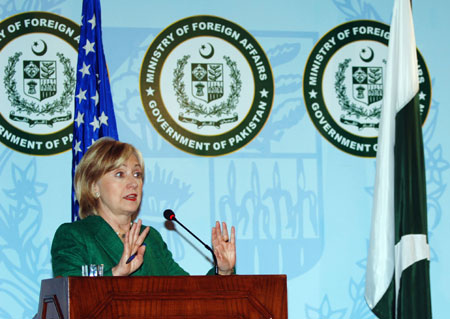Hillary Clinton: Pakistan not alone in terror war
The United States Secretary of State Hillary Clinton said on Wednesday that Pakistani is not alone in the fight against terrorism and the US would extend help to the country to achieve goals to defeat terrorism.
 |
|
US Secretary of State Hillary Clinton gestures as she addresses media representatives during a press conference at the Foreign Minister's office in Islamabad, Oct. 28, 2009. Hillary Clinton kicked off a visit to Pakistan, fending off criticism of US policies from within a key ally in the war on Islamists and promising new investments.[Li Jingchen/Xinhua] |
"Pakistan is not alone in this fight as this is our struggle as well," visiting Hillary Clinton said at a press conference along with her Pakistani counterpart Shah Mahmood Qureshi after their bilateral talks.
Hillary Clinton arrived in Islamabad on a three-day visit, her first to Pakistan since she assumed the office as the US Secretary of State.
"Pakistan and the United States are facing the security issue and Pakistan is currently engaged in the struggle to fight terrorists," she said.
She commended Pakistan military for their courageous fight and said the US stands shoulder to shoulder with Pakistani people in their fight for peace and security.
The US Secretary of State said the relationship between the two countries goes far beyond security and in Wednesday's talks both sides agreed to work closely as Pakistan continues its journey towards an effective, responsive and enduring democracy.
"The United States wants to provide help to Pakistan which its people think best for the country," she added.
Hillary Clinton said that the US seeks to turn the page to a new partnership not only with the Pakistani government but also with the people of democratic Pakistan.
She said during the talks both sides agreed to resume and intensify US-Pakistan strategic dialogue.
"The United States wants to help Pakistan in economic arena, wants to help create jobs, develop infrastructure, create investment opportunities and more access to education and healthcare," she said.
The Secretary of State said special envoy Richard Holbrooke and the US Ambassador in Islamabad are working closely with Pakistan to find ways and means to help overcome the country's energy crisis.
She announced the first phase of an energy program for Pakistan, which would help repair power facilities and promote energy efficiency.
She said the US would help install better equipment at Pakistan's Tarbela dam power station and help repair or replace more than 10,000 tubeless across the country, which would save energy and increase agricultural productivity. She said this first phase is only the beginning and there would be more intensive cooperation in this sector.
Pakistani Foreign Minister Shah Mahmood Qureshi emphasized the need for building a relationship based on trust, mutual respect and shared objectives between the two countries.
He said in Wednesday's talks the two countries discussed how tore-enforce the trust and how to understand sensitivities of each other's concerns and identify and align the objectives and strategic interests.
Qureshi said Pakistan is a resource rich country and it needs US support in using its resources. He said Pakistan needs greater market access as the country prefers trade to aid.
He said during talks they also talked about the importance of building capacity of institutions that can deliver and improve the quality of life of ordinary citizens, provide better health education, sanitation and pulling people out of poverty.
He said they also discussed how both sides can be sensitive to each other's core interests.
In her visit to Pakistan, Hillary Clinton will meet Pakistani President Asif Ali Zardari, Prime Minister Yousuf Raza Gilani, and other officials.
During the meetings with Pakistani leaders, the US Secretary of State will be briefed on the country's efforts to eliminate terrorism and the military campaigns in Swat and South Waziristan tribal area.
The debate on US aid through the Kerry-Lugar law which offers 7.5 billion US dollars in aid to Pakistan over the next five years and the army's reservations on the conditions attached to the US security assistance will also be discussed.
 0
0 







Comments